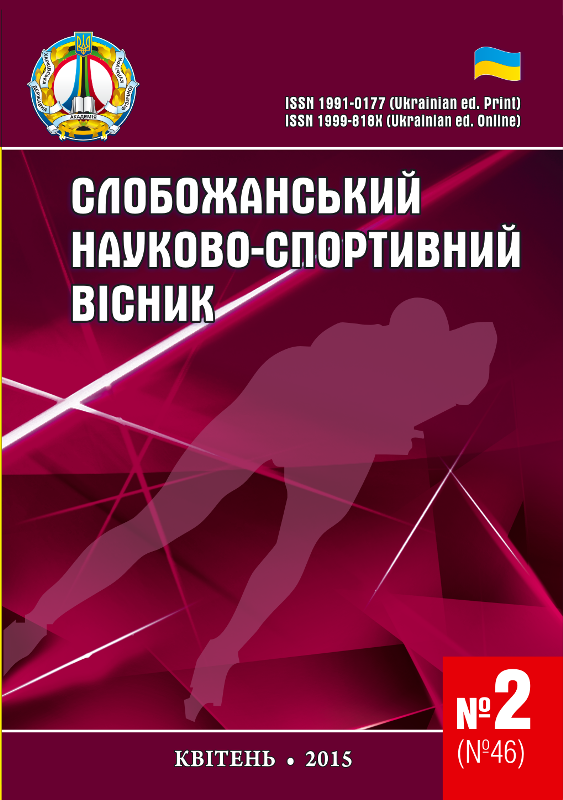Therapeutic physical training as a means of prevention for children with frequent episodes of acute respiratory diseases
DOI:
https://doi.org/10.15391/snsv.2015-2.030Keywords:
acute respiratory infections, prevention, exercise, children, complexes of the medical physical cultureAbstract
In the article the author described therapeutic physical training as a means of preventing recurrent acute respiratory diseases in sickly children. Purpose: to describe the main approaches to the appointment of medical physical training as a means of prevention of recurrent disease for children with frequent episodes of acute respiratory diseases. Material and Methods: analysis of the current literature on the researched topic. Results: the author defines the general and specific objectives of exercise therapy in sickly children, characterized by means of physical therapy appointment procedure for two periods – preparatory and trains, provides an approximate complexes of gymnastics and morning hygiene gymnastics for sickly children to training period.
References
Alyabyeva M. N. Lechebnaya fizicheskaya kultura pri bronkholegochnykh zabolevaniyakh u vzroslykh i detey [Therapeutic physical training with bronchopulmonary diseases in adults and children], Smolensk, 1977, pp. 68–69. (rus)
Besedina A. A., Sukharev A. G. Reabilitatsiya shkolnikov, perenesshikh ostryye respiratornyye virusnyye infektsii [Rehabilitation of students who have had acute respiratory viral infections], Kiyev, 1987, 72 p. (rus)
Kopunov Yu. M. Aktualnyye voprosy sostoyaniya zdorovya detey [Topical issues of child health], Moscow, 1980, p. 92–100. (rus)
Peshkov V. P., Peshkova O. V. Metodicheskiye printsipy postroyeniya reabilitatsionnykh dvigatelnykh rezhimov u rekonvalestsentov, perenesshikh ORVI v tyazheloy forme [Methodical principles of rehabilitation motor regimes in convalescents who have had SARS severe], Kharkov, 1992, 20 p. (rus)
Pеshkova O. V. Klіnіko-funktsіonalne obґruntuvannya reabіlіtatsіynikh rukhovikh rezhimіv ta printsipіv іkh pobudovi u trenovanikh ta netrenovanikh osіb pіslya GRZ : avtoref. k. med. n. [Clinical and functional study of motor rehabilitation regimes and principles of their construction in trained and untrained individuals after ARI :PhD thesis], Dnіpropetrovsk, 1996, 24 p. (ukr)
Peshkova O. V., Ananyeva T. G., Mikhaylova I. Ya. Sovremennyye problemy fizicheskoy kultury i sporta [Modern problems of physical culture and sports], Belgorod, 1997, pp. 467–469. (rus)
Pеshkova O. V. Slobozans’kij nauk.-sport. visn. [Slobozhanskyi science and sport bulletin], Kharkіv, 2006, vol. 9, pp. 114–120. (ukr)
Pеshkova O. V. Fіzichna reabіlіtatsіya pri zakhvoryuvannyakh vnutrіshnіkh organіv [Physical rehabilitation for diseases of internal organs], Kharkіv, 2011, 312 p. (ukr)
Tolkachev B. S. Fizkulturnyy zaslon ORZ [Physical culture barrier ARI], Moscow, 1988, 159 p. (rus)
Popov S. N. Fizicheskaya reabilitatsiya [Physical Rehabilitation], Rostov na Donu, 2003, pp. 303–335. (rus)
Khrushchev S. V., Simonova O. I.Fizicheskaya kultura detey s zabolevaniyami organov dykhaniya [Physical education of children with respiratory diseases], Moscow, 2006, 304 p. (rus)
Shabalov N. P. Detskiye bolezni [Childhood diseases], Saint Petersburg, 2006, 832 p. (rus)
Downloads
Published
How to Cite
Issue
Section
License
Copyright (c) 2015 (Olga Peshkova) Пєшкова Ольга Володимирівна

This work is licensed under a Creative Commons Attribution 4.0 International License.
Our publications make use of copyright CREATIVE COMMONS open access journals.
Authors published in this journal agree to the following terms:
1 The authors reserve the right of authorship of the work and pass the journal right of first publication of this work are licensed under the Creative Commons Attribution License, which allows others to freely distribute the published work with reference to the authors of the original work and the first publication of this magazine.
2 The authors have the right to enter into separate agreements for additional non-exclusive distribution of work in the form in which it was published the magazine (such as work place electronic repository institution or publish as part of the monograph), provided that the reference to the first publication of this magazine.

 Attention, authors!
Attention, authors!


